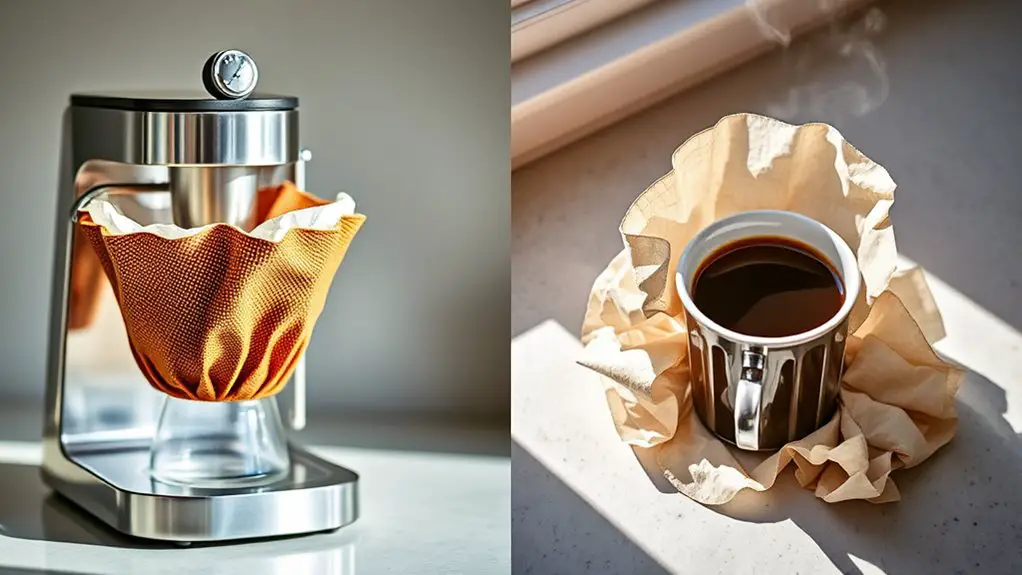When choosing between reusable and disposable coffee filters, consider taste, convenience, environmental impact, and costs. Reusable filters, like stainless steel or cloth, enhance flavor and reduce waste, saving you money over time, but they require more maintenance. Disposable filters offer convenience and cleanliness but contribute to landfill issues and ongoing costs. Your brewing style and personal preferences play a significant role in this decision. Exploring the specifics will help you determine the best option for your coffee needs.
Understanding Reusable Coffee Filters
While many coffee drinkers might not consider the type of filter they use, understanding reusable coffee filters can greatly impact both your brewing experience and the environment. These filters come in various material types, such as stainless steel, cloth, and nylon, each offering distinct flavors and brewing characteristics. For instance, stainless steel filters allow oils to pass through, enhancing the coffee's richness, while cloth filters can produce a cleaner cup. When it comes to cleaning methods, it's crucial to rinse your filter after each use and periodically deep clean it to avoid buildup. By choosing reusable filters, you not only enjoy a personalized brew but also contribute to reducing waste, aligning with a more sustainable lifestyle.
The Benefits of Disposable Coffee Filters
Although many coffee enthusiasts prefer reusable filters for their sustainability, disposable coffee filters offer several practical advantages that can enhance your brewing experience. The convenience factor is a significant benefit; you can simply toss the filter after use, saving time on cleaning. This ease of use is especially appealing for busy mornings or when entertaining guests. Additionally, disposable filters often provide excellent flavor retention, ensuring that your coffee maintains its intended taste without any residual flavors from previous brews. They're designed to trap oils and sediment effectively, resulting in a cleaner cup. If you value a quick, hassle-free brewing process without compromising flavor, disposable coffee filters might just be the ideal choice for you.
Environmental Impact of Each Option
When considering the environmental impact of coffee filters, it's essential to weigh the differences between reusable and disposable options. Reusable filters, often made from materials like stainless steel or cloth, promote sustainability practices by greatly reducing waste. You're not discarding a new filter after each brew, which contributes to waste reduction over time. On the other hand, disposable filters, typically made from paper, contribute to deforestation and landfill overflow. While they may seem convenient, their environmental toll can accumulate quickly. By opting for reusable filters, you're actively participating in a more sustainable lifestyle, reducing your ecological footprint. Ultimately, the choice hinges on your commitment to environmental responsibility and long-term waste management.
Cost Comparison: Reusable vs. Disposable
Choosing between reusable and disposable coffee filters often boils down to cost, and the difference can be quite stark. While disposable filters have a lower initial investment, their ongoing costs add up over time, making them less economical in the long run. Reusable filters, though they require a higher upfront cost, can lead to significant long-term savings.
| Type | Initial Investment | Long Term Savings |
|---|---|---|
| Disposable | Low | Minimal |
| Reusable | High | Substantial |
Personal Preferences and Brewing Style
How do your personal preferences and brewing style influence your choice between reusable and disposable coffee filters? Your brewing techniques play a significant role in this decision. If you enjoy experimenting with different methods, a reusable filter might be more appealing, as it often allows for a broader range of flavors. On the other hand, if convenience is your priority, disposable filters can simplify your routine.
Your flavor preferences are also essential; some coffee enthusiasts argue that reusable filters can enhance the richness of the brew, while others appreciate the clean taste that disposable filters provide. Ultimately, the choice between these options reflects your unique approach to coffee-making, balancing convenience, environmental impact, and the pursuit of that perfect cup.
Frequently Asked Questions
How Do Reusable Filters Affect Coffee Taste Compared to Disposable Ones?
When considering how filters affect coffee flavor, it's crucial to analyze your brewing method. Reusable filters might impart subtle tastes from previous brews, while disposable ones generally provide a cleaner, more consistent flavor profile.
Can I Use a Reusable Filter With All Coffee Makers?
Imagine a key unfastening various doors; similarly, a reusable filter's compatibility varies. Some coffee maker types might face compatibility issues, so verify your choice aligns with your machine's design for ideal brewing freedom and enjoyment.
Do Reusable Filters Require Special Cleaning Products?
Reusable filters don't require special cleaning products; however, effective filter maintenance involves simple cleaning methods, like rinsing and occasional deep cleaning with vinegar. This keeps your filter in top shape without unnecessary chemical additives.
How Long Can I Use a Reusable Coffee Filter Before Replacing It?
You'd think a reusable coffee filter lasts an eternity, but its lifetime expectancy hinges on proper filter maintenance. Typically, expect to replace it every six months to a year, depending on usage and care.
Are There Any Health Concerns With Using Reusable Coffee Filters?
Using reusable coffee filters can raise health concerns if not properly maintained. Some filter materials may harbor bacteria or mold. However, with regular cleaning, you can enjoy health benefits while minimizing risks associated with improper use.
